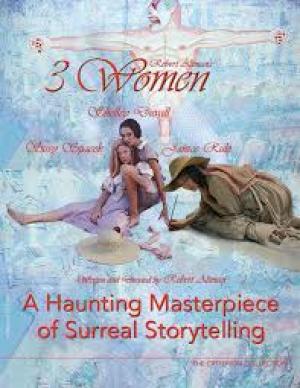Robert Altman and The Women
By Michael J. Roberts
"I look at film as closer to a painting or a piece of music; it's an impression . . . an impression of character and total atmosphere . . . The attempt is to enlist an audience emotionally, not intellectually. " ~ Robert Altman
Robert Altman was on a streak and taking no chances that he’d be able to make the kind of films he wanted to make indefinitely. He knew that Hollywood would quickly tire of him when he ceased making them money, so he used what cache he had in 1977 to release his most un-Hollywood film to date, the remarkable 3 Women. He talked 20th Century Fox into backing the small budget film as they were hoping he could repeat his M*A*S*H magic and produce another big hit, but they’d only heard an outline as a script didn’t exist. Nonetheless, Altman cast superbly (naturally) with his frequent star Shelley Duvall joined by Sissy Spacek and Janice Rule to complete the unlikely trio of women making sense of the world in a California desert dreamscape.
Pinky (Sissy Spacek) is a young, directionless woman who takes a job at a California spa for the elderly where she meets fellow attendant Millie (Shelley Duvall). She quickly becomes intrigued by her slightly manic colleague, who is very different in personality to the reserved Pinky, but the two become roommates. Pinky shares digs with Millie at a desert apartment block managed by husband and wife owners Edgar (Robert Fortier) and Willie (Janice Rule). Willie is pregnant and Edgar an obnoxious, womanising drunk. Pinky lives in thrall of the more confident Millie until there’s a falling out - an event pushes her over the edge and she ends up in hospital. A guilt stricken Millie helps nurse her back to health but it becomes clear Pinky is a changed woman.
Altman said the idea for the film came to him in a dream while he was seriously ill in hospital, and at many levels the film has a dreamlike ambience. It is also an impressionistic take on the aspects of female nature in a stark environment. Willie represents the mystical, earth mother type but a caged one trapped in a relationship with a drunkard dullard, a representation of an oppressive patriarchy. Pinky represents curiosity and hope, before she is overtaken by her obsessions and morphs into someone unexpected. Millie is the quiet acquiescence of the female who finds her worth primarily in the male gaze and sets her cloth accordingly. The interplay of an accidental sisterhood and the subtle rivalries that undermine their bonds is what elevates and enlivens the material, which becomes a tone poem dreamscape in the hands of a master craftsman like Altman.
3 Women is remarkable is many aspects, not least that there is no male lead to pull focus - it’s all about the women in an era coming to terms with the gains of Second Wave feminism. Altman slyly sidelines any overtly political implications in his treatise, but I would wager there’s a cool irony of making a film about powerless women in a hostile, male environment during the Betty Friedan/Gloria Steinem informed post-Vietnam generation. If as Ringo Starr observed ‘Flower power never made it to Leeds,’ then maybe Second Wave Feminism never made it to the Californian desert. Artistically it has its roots in the existential cinema of Bergman, and the obvious comparison would be Persona – a film about possession, identity and self, and Altman has deliberately made a less austere, quirky version set amongst a grab-bag group of American chancers. Being Altman, the characters have a warmth and a goofiness that plays against the disquieting subtext.
For all its visual heft and dreamlike ambience, it’s the central performances that underpin the film’s innumerable strengths. Janice Rule is fine as the earthy and more serious woman, having to deal with an alcoholic and violent husband, and she’s a great counterpoint to the odd couple of Spacek and Duvall. Sissy Spacek is astonishing as Pinky, all wide eyed innocence and warmth to conceal a calculating brain and a cold-blooded heart, and she won a New York Film Critics gong for her efforts. She’d hinted at that kind of range prior in Terrence Malick’s masterful Badlands some 4 years earlier and had recently enjoyed box-office success starring in De Palma’s Carrie and in the ensemble cast of Welcome to L.A. by Alan Rudolph (Altman’s close associate). Her work here is mesmerising and her hot streak continued to her next film, Coal Miner’s Daughter, for which she won an Oscar for Best Actress.
Shelley Duvall, however, walks away with the honours here, and it’s her Millie that stays in the mind long after the closing credits have ambled off into the desert. No other American actress could have made so much with so odd a part – it’s the perfect fit of performer and material and a testament to her relationship with Altman. It was her sixth film with the director, and despite her success in the previous Altman films (including Best Picture hit Nashville in 1975) she (remarkably) hadn’t yet made another film with another director. Robert Altman recognised what was special about Duvall and nurtured and cherished her talent and understood her artistry - 3 Women is the sum of all that understanding and love between two artists working on the same wavelength. It soon became apparent how fragile that compact can be, when Duvall attempted mainstream breakout success by working with Stanley Kubrick on The Shining – where his meticulous and exacting demands (one sequence involved 127 retakes) and their testy relationship took a strain on the actress.
Personal cinema, of the type pursued by Altman, was not typical of the mainstream and the closest parallel might be the so-called Indie aesthetic of John Cassavetes, a maverick and uncompromising auteur forever on the fringes as a director at least. Robert Altman soon bumped up awkwardly against the mainstream machine when he cast Duvall as Olive Oyl against Robin Williams titular character in the poorly received and much maligned Popeye in 1980. Duvall’s career sadly never recovered its glow and Altman retreated for a decade into low budget land before he came thundering back with The Player in 1992. 3 Women remains a striking masterpiece and a highpoint in both of their artistic achievements and a legacy for the ages.








